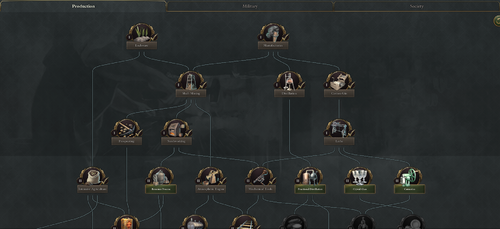Katyusha233(讨论 | 贡献) (→Eras) |
Katyusha233(讨论 | 贡献) (→科技扩散) |
||
| 第35行: | 第35行: | ||
== 科技扩散 == | == 科技扩散 == | ||
政府资助或主导的研究并不是大部分国家接触新思想的主要形势。在游戏中,始终将会有一项科技在国内进行传播,且不受玩家控制。这项科技始终为一项国家在当前时代的未研究科技,且已经有其他国家完成了此项科技的研究。 | |||
科技扩散速度很大程度取决于人口的识字率。此外,超越识字率限制的创新点数将也被计入科技扩散中。'''换句话说,建设超量的大学或许不能保证该国在科技上领先他国,但能依靠大量的科技扩散确保不会与其他国家产生巨大的科技差距。''' | |||
科技扩散也受“[[人权法律|言论自由]]”法律的影响。更加严格的审查政策将会提供更多的 {{icon|authority}} 权威力,但也将减少科技扩散。而在特定情况下,通过严格的审查政策来减少科技扩散并不是坏事,尤其是玩家不希望新科技的解锁导致国内政治局势剧变以及识字人口对生活水平期望上升时。 | |||
== Layered research == | == Layered research == | ||
2022年11月15日 (二) 10:26的版本
维多利亚3的所处的时代在各个领域都出现了革命性的进步,在游戏中则体现为三个独立的科技树:生产科技、军事科技以及社会科技。
三个科技树共计拥有约175项不同的科技。科技树以从上到下的顺序排列,每项科技可能都需要一个或数个前置科技,并通向一个或数个后续科技。不少国家在开局时都拥有20-30个已研发科技——取决于这些国家开局时的经济、法律、军事以及外交。通常来说,走在时代前列的国家每年都能研发出一项新科技,但并不是每个国家的科研进度都完全相同。
维多利亚3的科技系统将随着时代的发展改变并塑造游戏。尽管一些科技将会给予直接的增益,但科技的主要功能是解锁新的行动、选项——抑或是挑战。通常来说,一项新科技的研发不会对国家产生立竿见影的效果,而是为更多的玩法提供了可能性。新科技或理念的产生也将成为该国变革的催化剂,人民或许会拥抱它们,抑或是回避它们......
科技树类型
生产科技
- 主条目:生产科技
所有生产科技都可以在不同方面提高国家的经济实力。其中一部分能够提高特定/所有类型建筑的产出。也有部分科技允许工厂更高效率地使用劳动力。研究生产科技也将允许国家向铁路时代迈进,并允许生产一些开局时不存在的商品,例如橡胶、电力以及汽车。
军事科技
- 主条目:军事科技
军事科技专注于增加国家的陆军及海军实力。包含了新武器科技、学说以及士兵和军官的不同组织形势。部分科技将使得国家获得更稳定的人力储备,抑或是在战斗失败后被敌方占领更少的领土。军事科技树的海军部分则大部分专注于获得新的海军舰船类型,但也包括少量其他科技:包括但不限于提高特定海军任务的效率、对民用港口的升级以及对补给和贸易系统的增益。
社会科技
- 主条目:社会科技
社会科技涵盖了国家组织理念的方方面面。其中包含了政治、经济、外交等诸多领域。特定科技也将极大影响利益集团以及国内的政治格局,例如解锁新的政党。就如同生产科技可以解锁新的生产方式一样,特定社会科技也将解锁在之前的人们看来极为荒谬的法律或意识形态。
此外,社会科技也有助于改善国家的财政系统,例如“国家银行”科技将增加铸币收入并解锁资助其他国家以及承担他国债务的能力;“中央档案柜”科技能够提高税收能力(这对部分拥有巨量人口但税收能力严重不足的国家极为重要),并解锁“秘密警察”法律,并使得研究“身份证”科技成为可能。
时代
时代 是根据历史上特定科技/理念初次出现的时间对科技树进行的粗略分类。
- 时代 I 包含了那些在1836年前的世界就已经为大部分国家所知的科技。
- 时代 II 的科技大部分都与第一次工业革命密切相关(1836年-19世纪中期)。
- 时代 III 代表了一段新科技进行演变、稳定以及标准化的时代,一直持续到19世纪末。
- 时代 IV 对应世纪之交时第二次工业革命相关的科技。
- 时代 V 包含了着向现代进行过渡的科技。
时代不仅仅是一个体现目前国家科技水平的装饰性系统,超越当前时代研究下一个时代的科技也将变得更加困难。具体来说,跨时代研究科技本身就十分困难,每有一项前一时代的未研究科技都将使得后续科技的研究更加困难。尽管并没有“对特定科技的研究将在特定年代解锁”的设定,游戏机制本身也并没有禁止超前研究在真实历史中属于下一个时代的科技,但这毫无疑问是一种相当低效的行为。除非此项科技能够使得国家在短期内对其他国家形成巨大的优势(例如特定军事科技),或者对国家目前的发展至关重要。
科技扩散
政府资助或主导的研究并不是大部分国家接触新思想的主要形势。在游戏中,始终将会有一项科技在国内进行传播,且不受玩家控制。这项科技始终为一项国家在当前时代的未研究科技,且已经有其他国家完成了此项科技的研究。
科技扩散速度很大程度取决于人口的识字率。此外,超越识字率限制的创新点数将也被计入科技扩散中。换句话说,建设超量的大学或许不能保证该国在科技上领先他国,但能依靠大量的科技扩散确保不会与其他国家产生巨大的科技差距。
科技扩散也受“言论自由”法律的影响。更加严格的审查政策将会提供更多的 ![]() 权威力,但也将减少科技扩散。而在特定情况下,通过严格的审查政策来减少科技扩散并不是坏事,尤其是玩家不希望新科技的解锁导致国内政治局势剧变以及识字人口对生活水平期望上升时。
权威力,但也将减少科技扩散。而在特定情况下,通过严格的审查政策来减少科技扩散并不是坏事,尤其是玩家不希望新科技的解锁导致国内政治局势剧变以及识字人口对生活水平期望上升时。
Layered research
Embarking on the research of a new technology is a simple matter of clicking on the tech in the tree one would like to focus on, and time will take care of the rest. As time is perhaps the most precious resource in Victoria 3, falling behind one's neighbors could be a death sentence for their country -- or at least might force the player to cede their right to self-determination. The pace at which a research progresses is therefore of the utmost importance.
For all actual purposes and reasons, research in the game is layer based. The top most layer (innovation) is being affected by the most bottom layer (education institution).
创新力
The rate by which countries develop new technologies is measured by ![]() innovation. All countries start with a small amount of innovation capacity.
innovation. All countries start with a small amount of innovation capacity.
Countries which can afford it may construct and fund university buildings, which employ academics and clerks to boost innovation and thereby speed up the pace at which they discover new things.
Another way to improve research speed is to ensure the industrialists, armed forces, or intelligentsia are satisfied with the state of the country, as this will cause the effective cost of the tech tree associated with them to drop respectively. If only one of these groups are pleased with the society being built, this will incentivize focusing the research on that tree since it's relatively advantageous. For example, a country with a large army and laws favoring patriotic, loyalist, and jingoist ideologies would also progress faster in their military technologies, though they may fall behind on production and society technologies.
识字率
The amount of innovation which can used to actively research a chosen technology is capped by a country's ![]() literacy. Literacy is the percentage of the pops in the country's incorporated states that know how to read and write at any given point. For example, if the most educated people in society decide they've had enough and move abroad, its average literacy will drop, to the benefit of the other country. If a war utterly devastates the backwaters of the nation and slaughters the hundreds of thousands which were conscripted to defend it, its average literacy might increase.
literacy. Literacy is the percentage of the pops in the country's incorporated states that know how to read and write at any given point. For example, if the most educated people in society decide they've had enough and move abroad, its average literacy will drop, to the benefit of the other country. If a war utterly devastates the backwaters of the nation and slaughters the hundreds of thousands which were conscripted to defend it, its average literacy might increase.
This means that even if a country's universities are top-notch, its ability to effectively incorporate new learnings will be hampered by a poorly educated population. Those countries who aim to be the guiding light of global progress must maintain a solid primary school system in addition to universities that carry out their research.
受教育机会
Literacy is a product of a pop's education access. If a given pop has 30% education access, over time 30% of individuals in that pop will become literate. The pace by which this value changes is dependent on the birth- and death rate of the pop, since this sort of learning happens mostly in the early years.
A pop's wealth provides it with a base level of education access, and wealth often varies substantially depending on profession, making higher-paid professions have greater education access. However, literacy is often a limiting factor to a pop's ability to qualify for those jobs in the first place, so relying solely on wealth for education access could severely limit a country's social mobility and opportunity for economic growth.
Education institution
The main source of education access comes from the education institution, which must be established by a law and can be run by either the religious authorities, the private sector, or by a public administration depending on your school system law.
Each of these systems have their advantages:
- A religious school system keeps your priesthood strong and helps ensure unity of faith.
- A private school system works just peachy for pops with high wealth levels and ensures the working class don't get strange ideas.
- A public school system lets you enact mandatory schooling for children and encourages cultural assimilation.
参见
- To update page content see reference files in folder Victoria 3\game\common/technology/technologies:
- Each tech tree has its own
txtfile (named after the tech tree).
- Each tech tree has its own
- To update era details see reference file in folder Victoria 3\game\common/technology/era/00_eras.txt:
